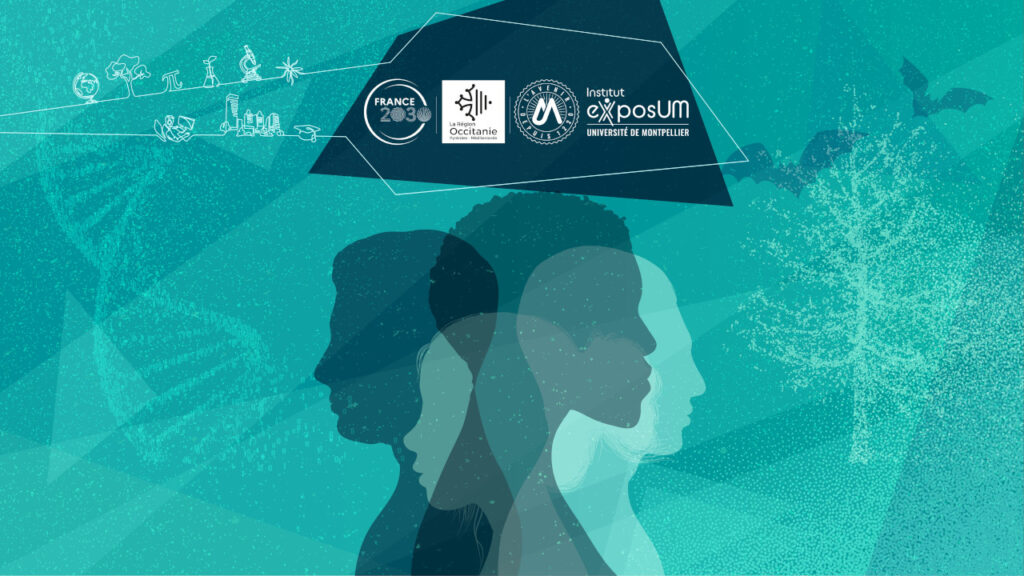ExposUM Doctoral Nexus: thesis topics for 2025 – applications closed
What is the ExposUM Doctoral Nexus program?
The Doctoral Nexus programs offered by the ExposUM Institute are networks of 3 to 4 doctoral researchers from different disciplines and affiliated with at least two different research units.

Compared to a traditional thesis, participating in a Doctoral Nexus will promote the ability to work in a team and design projects in a transdisciplinary manner while deepening one's own field of expertise.
A specific educational program will be offered, and the doctoral students concerned will also have the opportunity to organize a seminar within the Nexus network.
Theses are funded for four years from the outset, covering the doctoral student's salary and an environmental budget.
On the following page, you will find the ExposUM Doctoral Nexus projects that were selected as winners of the 2025 Doctoral Nexus Call for Proposals.
How to apply?
The specific application procedure is described in the thesis topics. Interested candidates are invited to submit their applications by May 31, 2:00 p.m. CET.
Thesis topics for 2025: applications closed
Nexus AMYLOPATH "Exploring Microbe-Induced Amyloidoses through an Interdisciplinary Approach"
- Topic 1 "Development and application of computational approaches to study the mechanisms of microbe-induced amyloidogenesis."
AMYLOPATH topic 1 Kajava EN - Topic 2 "Co-condensation of yeast prion-like proteins"
AMYLOPATH topic 2 Caudron EN - Topic 3 "Gut microbiota and amyloidosis in Alzheimer's disease"
AMYLOPATH topic 3 Claeysen FR
AMYLOPATH topic 3 Claeysen EN
Nexus CLIMAnX "Experienced or anticipated climate change and mental health: from anxiety to adaptive well-being"
- Topic 1 "Impact of environmental disasters on the consumption of psychotropic drugs in France"
CLIMAnX topic 1 Artero & Parmentier FR
CLIMAnX topic 1 Artero & Parmentier EN - Topic 2 "Preclinical study of the influence of heat stress on brain activity and cognitive and social performance"
CLIMAnX topic 2 Becamel & Givalois FR
CLIMAnX topic 2 Becamel & Givalois EN - Topic 3 "Climate anxiety, mental health, and student success: factors, consequences, and educational interventions"
CLIMAnX topic 3 Bächtold & Brun FR - Topic 4 "Modalities of exposure to climate risks, eco-anxiety, and social cohesion"
CLIMAnX topic 4 Rey-Valette & Bazart FR
CLIMAnX topic 4 Rey-Valette & Bazart EN
Nexus EXPO-PMT "Integrated approach to persistent, mobile, and toxic pollutants in water resources: assessment of their contribution to the EXPOsome, recommendation of adaptation solutions"
- Topic 1 "Contribution of PMTs to the aquatic exposome: diagnosis and treatment of water resources intended for human consumption"
EXPO-PMT topic 1 Brosillion, Gomez EN - Topic 2 "Modeling the spatio-temporal toxicological impacts of PMTs in the drinking water sector"
EXPO-PMT topic 2 Servien, Patureau EN - Topic 3 "Exploring strategies for adapting drinking water services to the degradation of resources by emerging micropollutants: Development of a diagnostic and decision-making support method"
EXPO-PMT topic 3 Guérin-Schneider FR
Nexus INTEGRAAL "Interoception, Exposome, Gut Microbiota, Rheumatoid Arthritis, Artificial Intelligence & Ontological Linking"
- Subject 1
INTEGRAAL subject 1 Olié FR - Topic 2 "Integrative understanding of the link between environment, microbiota, self-perception, and rheumatoid arthritis"
INTEGRAAL topic 2 Immediato-Daien & Bourinet FR - Topic 3 "Hybrid model for predicting rheumatoid arthritis (RA) based on machine learning enriched by a dynamic ontology of the disease and the exposome"
INTEGRAAL topic 3 Bringay & Abrouk FR
Nexus LEPTONEX "Leptospires and Exposure Nexus: interactions between humans, dogs, nutria, and the environment"
- Topic 1 "Geographical, social, and cultural determinants of risks associated with interactions between humans and nutria"
LEPTONEX topic 1 Caillon FR
- Topic 2 "Multiscale modeling of the spatial dynamics of nutria"
LEPTONEX topic 2 Gimenez FR
LEPTONEX topic 2 Gimenez EN - Topic 3 "Characterization of the diversity and circulation dynamics of leptospires in nutria populations through a combination of epidemiological and landscape genetics approaches"
LEPTONEX topic 3 Charbonnel FR
LEPTONEX topic 3 Charbonnel EN